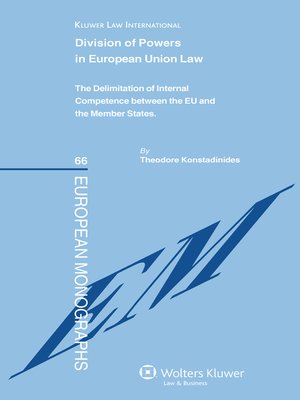Division of Powers in European Union Law
ebook ∣ The Delimitation of Internal Competence between the EU and the Member States · European Monographs
By Theodore Konstadinides

Sign up to save your library
With an OverDrive account, you can save your favorite libraries for at-a-glance information about availability. Find out more about OverDrive accounts.
Find this title in Libby, the library reading app by OverDrive.



Search for a digital library with this title
Title found at these libraries:
| Library Name | Distance |
|---|---|
| Loading... |
The European Union has flourished and expanded over the last fifty years as a unique system that lies midway between a federal state and an anarchical international system. Different actors coexist within a cooperative hegemony of Member States, and the allocation of competences and decision-making among them has always been at the centre of the integration process. In fact, demands for clearer limits to the Union's decision-making power and enduring tension over the nature and purpose of European integration have been the key drivers of integration and change.
This deeply informed and thoughtful book thoroughly examines the manner in which the principle of division of powers has developed in EU Law over the course of European integration, and casts light on the path towards a more efficient delimitation of internal competence between the main actors: namely, the European Union and the Member States. Among the topics investigated in depth are the following:
Addressing numerous crucial issues – among them the degree of permanence of the nation-state in a context of ambiguous constitutional authority, and the width of the democratic base of the Union's 'institutional dynamic' of cooperation and consensus – the author lucidly describes a seeming paradox: an 'ever-closer union', with a growing democratic legitimacy, congruent with a supranational community that falls short of a fully-fledged democratic political entity. The countless perspectives and clarifications discovered along the way are sure to engage academics and policymakers working in the fields of the European integration project, and will provide ample insights and food for thought.







